The centennial celebration of Otar Taktakishvili, one of Georgia’s most revered composers, unfolded at the Tbilisi Opera and Ballet Theater, offering a night of immersive retrospection and reverence. The program, a rich tapestry of live performances interwoven with recorded archival footage, created a multi-layered journey through Taktakishvili’s musical landscape. It was a reminder of his lasting influence on Georgian classical music and the universal nature of his compositions, which transcend both time and space.
The memorial evening was an homage not just to the man, but to the narratives he built through music. Live performances, starring the Tbilisi Opera and Ballet Theater Soloists, Choir, Orchestra, and the Ensemble ‘Rustavi,’ were augmented by the inclusion of historical recordings. This duality—of past and present—created a poignant fusion, where the boundary between memory and immediacy blurred, immersing the audience in both a celebration of life and a meditation on the endurance of art.
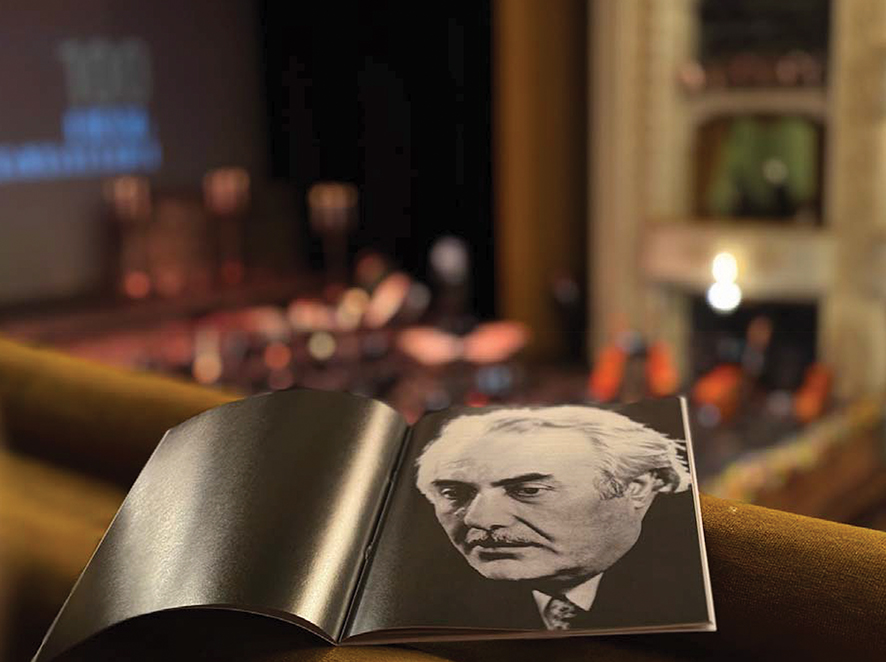
The Immortal ‘Mindia’: From Storytelling to Sonic Power
The night began with the grandeur of Mindia, one of Taktakishvili’s most significant operatic works. The Tbilisi Opera Orchestra and Choir delivered a powerful introduction, setting the tone for the evening’s emotional depth. The first live aria, sung by Giorgi Sturua, drew the audience into the internal world of the tragic hero, Mindia, whose melancholic melodies carry the weight of ancient Georgian myths. Sturua’s vocal interpretation was rich with pathos, bringing both vulnerability and strength to the character.
Sulkhan Gvelesiani’s rendition of Chalkhia’s scene and ballade from Act 2 was equally moving, as he skillfully navigated the intricate emotional layers of the role. The audience was transported to a world of myth, where Taktakishvili’s compositions breathe life into ancient characters, their struggles, and desires. These live moments were contrasted by archival recordings, which introduced the historical voices of iconic Georgian singers. Recordings of Merani and Separation, featuring Zurab Anjafaridze and Zurab Sotkilava respectively, resonated like echoes from another era, threading the past into the present.
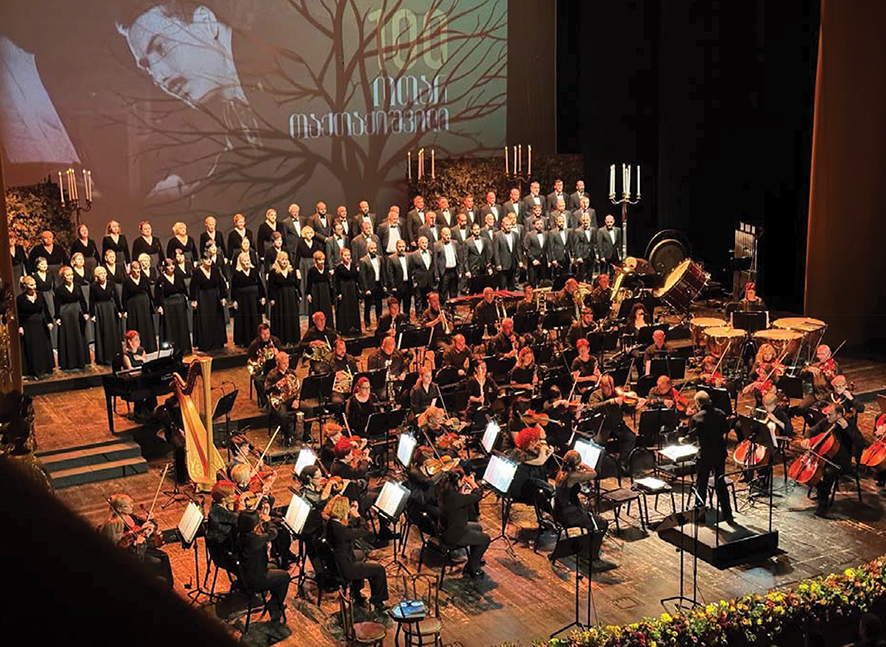
The Melodic Nostalgia of the First Love
The First Love, another cornerstone of Taktakishvili’s operatic achievements, was given both live and recorded treatment throughout the evening, offering a vivid contrast between past interpretations and modern renditions. Liana Kalmakhelidze’s live performance of Margalita’s aria was a highlight, her voice blending tenderness and sorrow in a way that felt timeless. This was juxtaposed against archival recordings of Ertaoz’s arioso by Teimuraz Gugushvili and other key arias by Imeri Kavsadze and Eldar Getsadze, creating an emotional kaleidoscope that underscored the eternal nature of love, as conveyed through music.
Kalmakhelidze’s live performance imbued the role of Margalita with a contemporary resonance, while the inclusion of historical recordings reminded the audience of the different generations of artists who have brought these characters to life. The audience was left in awe of how Taktakishvili’s music bridges these eras, transcending individual performances.
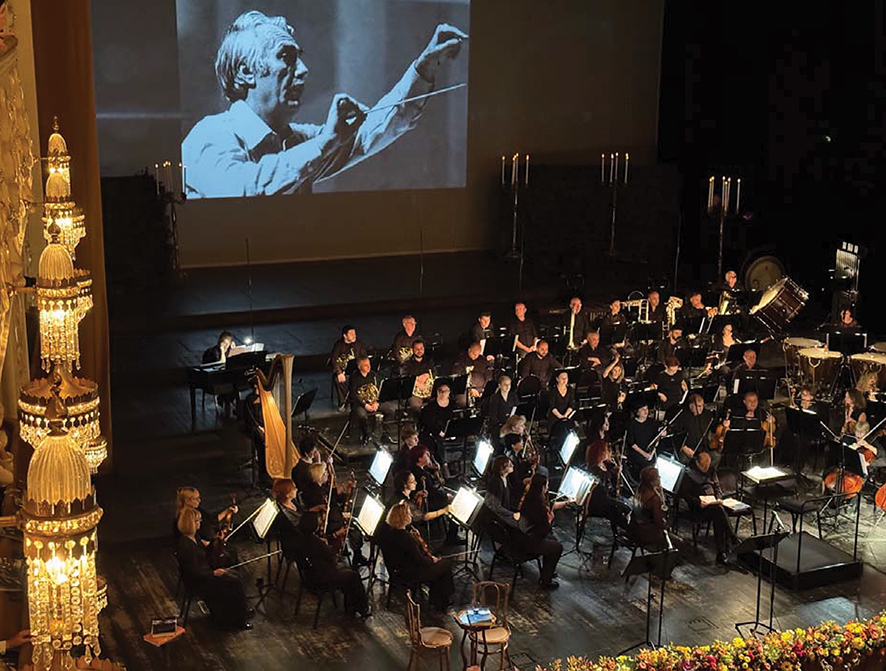
In the Steps of Georgian Legends, Rustaveli and Nikoloz Baratashvili
The evening continued with In the Steps of Rustaveli, where Vardzia and Palestina were performed by Giorgi Chelidze and the Tbilisi Opera Chorus, paying tribute to Georgia’s literary and cultural heritage. The vocal performances here were steeped in reverence, not only for Taktakishvili’s compositions but also for the history and landscapes they evoke. The haunting beauty of these pieces, inspired by Georgia’s medieval poet Shota Rustaveli, transported listeners into the heart of Georgian identity.
The choral harmonies and orchestral interludes reverberated with a sense of ancient continuity, as if the music itself were carved into the rocks of Vardzia. The retrospective recordings that followed served to underline the lasting impact of Taktakishvili’s work on Georgian culture.
A climactic moment came with Nightfall on Mtatsminda from Nikoloz Baratashvili, where Giorgi Sturua and David Gvelesiani’s duet, supported by Ensemble Rustavi and the Tbilisi Opera Choir, delivered a dramatic, stirring performance. The emotional weight of this piece, which draws upon the life of Georgia’s romantic poet Nikoloz Baratashvili, further showcased Taktakishvili’s ability to capture the soul of a nation in musical form.
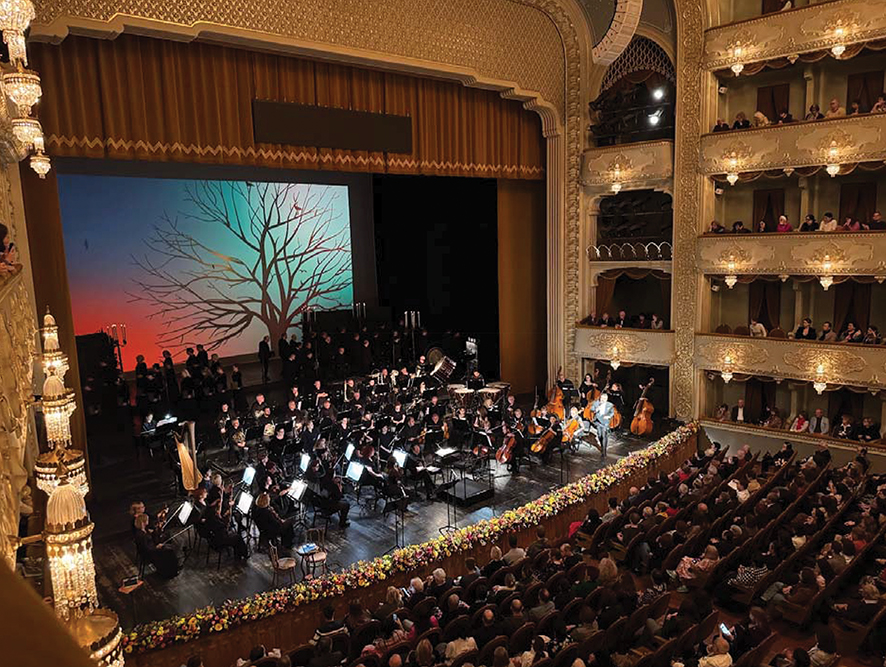
A Return to Myth: The Abduction of the Moon
The evening reached its zenith with selections from The Abduction of the Moon, an opera steeped in Georgian folklore. Iano Alibegashvili’s Tamar’s aria was both ethereal and forceful, capturing the otherworldly beauty of the moon and the tragic love story at the heart of the opera. The duet between Tarash and Tamar, performed by Khatuna Chokhonelidze and Sulkhan Gvelesiani, was a masterful interplay of voices, each singer embodying the tension between earthly desire and celestial separation.
As the final aria of The Abduction of the Moon filled the theatre, the audience was enveloped in a sense of closure and transcendence. The Tbilisi Opera Choir Orchestra brought the evening to a majestic close, their voices and instruments swelling with the weight of Taktakishvili’s legacy.
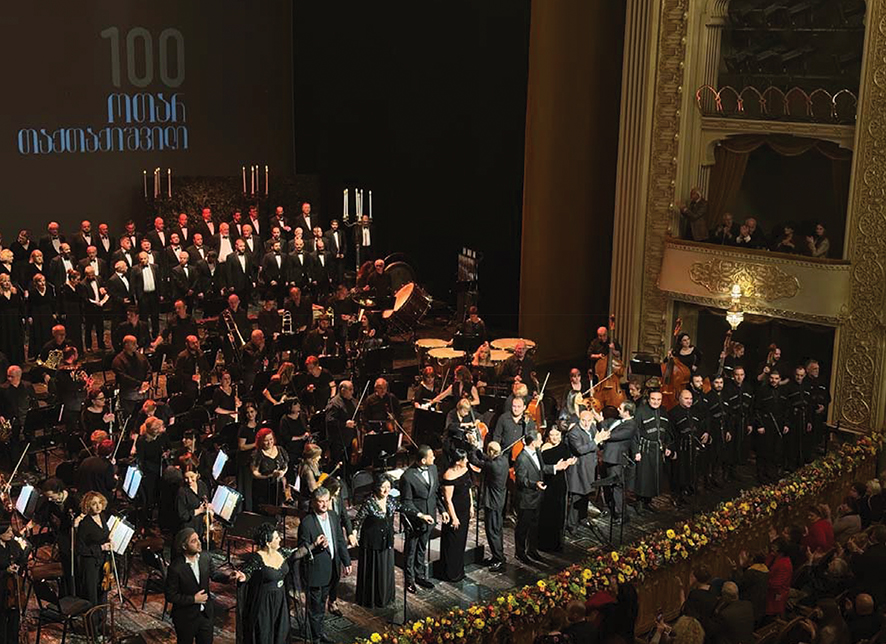
The Pillars of the Evening
At the heart of the evening’s grand success were not only the soloists but the collective forces that upheld the musical architecture: the Tbilisi Opera and Ballet Theatre Orchestra, Choir, Ensemble “Rustavi,” and the steady hand of conductor Zaza Azmaiparashvili. Together, they brought Taktakishvili’s scores to life with precision and passion, creating a lush sonic landscape that allowed the audience to be fully immersed in the composer’s world.
The orchestra, under the masterful direction of Azmaiparashvili, played with a deep sense of dynamism and control, moving seamlessly between the gentle, lyrical passages and the thunderous climaxes that define Taktakishvili’s compositions. The balance between the strings, woodwinds, brass, and percussion was exquisite, each section contributing to the rich emotional tapestry of the evening. Whether in the soaring introduction to Mindia or the poignant intermezzo from The First Love, the orchestra carried the narrative, adding layers of depth and nuance to the soloists’ performances.
The Tbilisi Opera Chorus, too, was integral to the evening’s emotional weight. Their harmonies, rich and resonant, filled the theatre, enhancing the grandeur of pieces like In the Steps of Rustaveli and The Abduction of the Moon. Their ability to blend power with subtlety was particularly striking in the choral sequences, where they shifted from delicate, prayer-like intonations to full-throated crescendos, evoking the timeless beauty and tragedy of Georgian folklore.
The Ensemble “Rustavi” added another layer of authenticity to the performance, embodying the soul of Georgia’s folk traditions. Known for their mastery of Georgian polyphony, they wove their voices into the fabric of the evening, particularly during the deeply evocative Nightfall on Mtatsminda, where the ancient harmonies mirrored the mountain landscapes and cultural history that inspire much of Taktakishvili’s work.
Zaza Azmaiparashvili’s direction was the quiet force behind this evening of musical homage. His deep understanding of Taktakishvili’s compositions and his sensitivity to the needs of both the soloists and the orchestra allowed for a seamless integration of live and recorded elements. His pacing was impeccable, moving between the more intimate, introspective moments and the sweeping, grand passages with a sense of inevitability that kept the audience on an emotional journey throughout. Azmaiparashvili’s baton became the bridge between past and present, his leadership ensuring that Taktakishvili’s music resonated as vividly now as it did a century ago.
A Composer of Eternity
The program concluded with a haunting performance of Holy Mother from the song cycle based on Galaktion Tabidze’s poetry, followed by the final aria from Mindia, reminding the audience that Taktakishvili’s music, much like the subjects it portrays, is immortal.
Through this memorial evening, Tbilisi paid tribute not just to a composer but to a man whose work captured the heartbeat of Georgia. Taktakishvili’s music, as evidenced by the seamless blend of live performances and historical recordings, speaks across generations, keeping Georgian cultural heritage alive in every note. The evening was not merely a concert but a living archive of Georgia’s soul, preserved and projected into the future through the universal language of music.
Review by Ivan Nechaev














